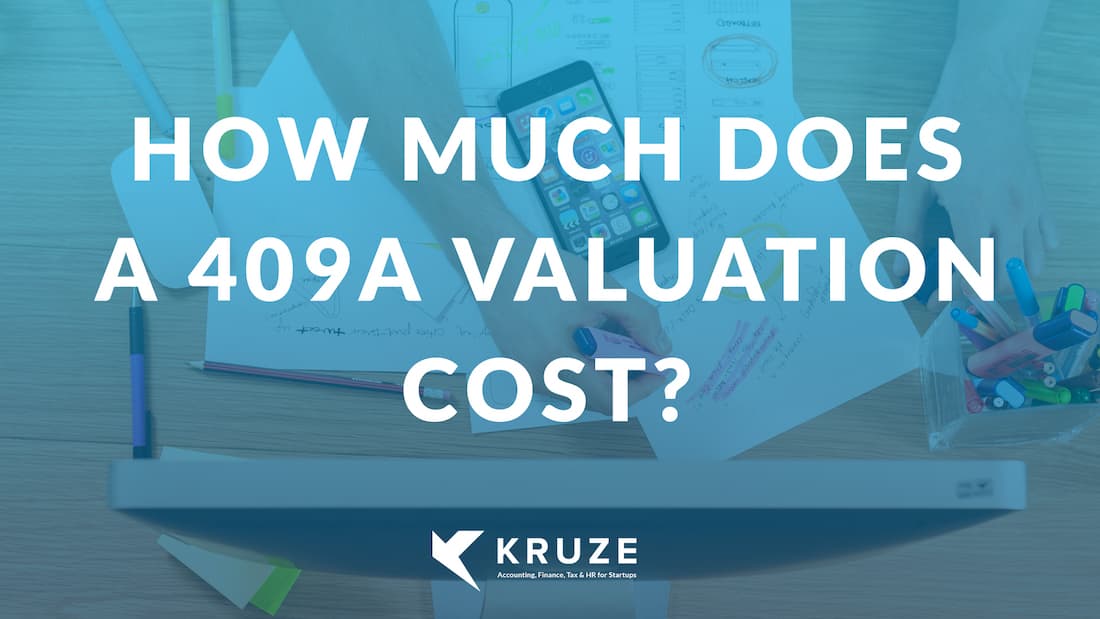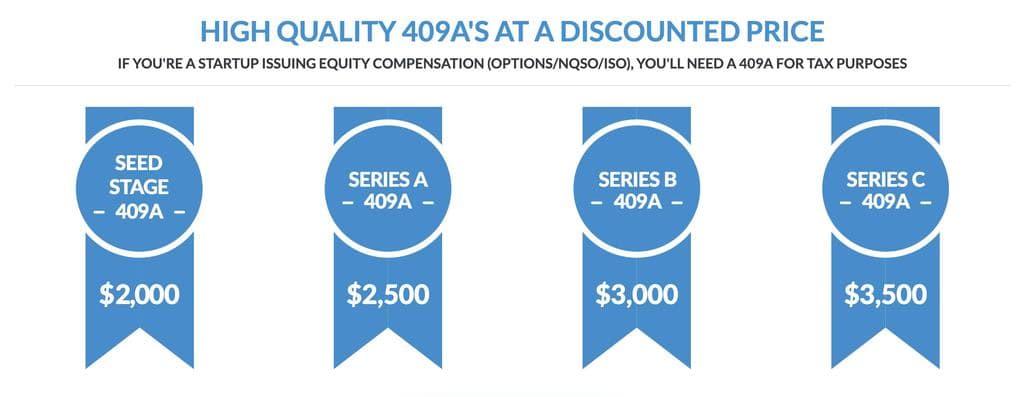Startup Q&A
How much does a 409A valuation cost?
Table of contents

IRS tax code mandated 409A valuations typically cost between $2,000 to $5,000+ depending on the complexity of the exercise and the valuation provider. Startups that use cap table software companies spend over $3,000 annually, and many spend over $10,000. Kruze's 409A pricing is typically superior - and our reports are usually delivered faster.

Kruze charges $2,000 for a seed-funded company 409A valuation, $2,500 for a Series A, $3,000 for a Series B and $3,500 for a Series C. As a frame of reference, you’ll find that other firms charge $4,000+ for a Seed Stage 409A, and $5,000+ for a Series A 409As. Other companies sign you up for a monthly recurring charge that eventually can equal thousands of dollars a year in costs.
Valuations Performed by Top 409A Firms
Our valuation partners have the highest certifications and designations and perform over 150 409A valuations per month. They are former Big 4 valuation partners and investment bankers from top firms. No work is done offshore. Unlike many valuation companies, they are responsive to a company’s unique needs and will work to make sure that the valuation report takes into account each startup’s particular situation.
Why Not Just Use a Capitalization Table Software Vendor?
Some of the capitalization table software vendors now offer 409A valuations for “free.” The biggest issue that we’ve seen with these valuations is that they don’t always have the understanding or flexibility to adjust their numbers based on your company’s unique circumstances. In particular, we’ve seen way too many of these valuations come in at a VERY high number, meaning that your new employees are going to be burdened with incorrectly high strike prices on their options. This really hurts your recruiting efforts; you really want a fair market value vs an inflated strike price that doesn’t reflect the reality of how employees will think about your company’s strike prices.
Why do these software companies come up with unreasonably high valuations? Mainly because they don’t have enough experienced valuation professionals to really understand what is going on in the business. Instead, they have built software (or maybe it’s just a big Excel spreadsheet, who knows) that is run by junior “call center” level people. These people don’t have the training or authority to challenge the numeric output from their software. And since the valuation is “free” they are not incentivized to spend the time to come up with the right number. If you feel like your cap table company has come up with too high of a 409A valuation, see if our team can put in the time to really understand what your company is worth.
What is included in the Cost of a 409A report?
The process begins by thoroughly analyzing your financial history and your financial model, while also taking into consideration the intangible value of your startup in the current economic state. We apply valuation methodologies and assumptions that are specifically tailored to your unique situation. The valuation methodology follows AICPA and USAPAP guidelines closely making the reports audit ready. Upon conclusion of our findings, you will receive a 30+ page in depth 409A report that is readily shareable with your investors and Board.
| Startup Funding Level | Kruze 409A Cost | What Others Charge |
|---|---|---|
| Seed | $2,000 | $4,000 |
| Series A | $2,500 | $5,000 |
| Series B | $3,000 | $5,000+ |
| Series C | $3,500 | $5000+ |
What does a 409A valuation report cover?
A 409A valuation is an impartial evaluation of your startup’s common stock, and it’s used to establish the cost of purchasing a share of stock. So employees, contractors, advisors, and anyone else who receives options for common stock will pay the price determined by the 409A valuation report. The best 409A valuation reports will include a summary of the 409A provider’s findings, which is what founders and CEOs are most concerned with. The other sections, though, are important to make your 409A auditable by the IRS. Those include sections on the valuation methodologies used, your company’s history and structure, your financial statements, your capitalization table, information about the appraisers, and much more.
When does a Startup need a 409A valuation?
A startup will need to start issuing 409A reports before it issues equity compensation (options/NQSO/ISO). A 409A Valuation through Kruze Consulting can be completed in 10 business days. The valuation is valid for 12 Months unless the startup raises another round of capital or has significant changes, at which point a new valuation is highly recommended.
What Methodologies are Used in a Good 409A?
Typically one to three different methodologies are used. The most frequent way is what’s called a Back Solve Method. This takes into account the most recent preferred stock valuation, which the price that the most recent venture capital investment happened at. And it is discounted back, usually so that the common stock is worth about 30% to 40% of the price of the preferred stock.
The second way that stock options are valued are on a Cost to Recreate basis. This means that you tried to build all the technology again, how much would it cost? There is certainly some subjectivity in this, and it also requires some work by the founder to fill out a very detailed worksheet that says how much all this would have cost to build.
The final method is called a Discount Cash Flow Analysis. This attempts to project the cash flows into the future and discount them back to a current value. This method works well for more mature companies, but isn’t very good for early-stage companies because they lose money for a long time. And the discount rates bump all over the place and can be rather subjective. So this is not the best way to value an early-stage business.
One Major Reason 409A Valuation’s Now Cost Less - Back-Solve Method
As we just mentioned, there are a couple of different ways you get to a 409A evaluation, like the Back-Solve Method, the Cost to Recreate, the Discounted Cash Flow and the Comparable Company Analysis.
The Back-Solve Method 409A valuation method is actually one of the most popular. And that’s partially because it’s actually fairly simple. And it’s one of the major innovations that have allowed 409A valuations to come down in price. 15 years ago, 409A valuations used to cost something like 20,000, which is crazy. Nowadays it costs much less as you can see from our pricing charts above - like $2,000 to $5,000. So a huge decrease in the cost.
Let’s dig into the Back-Solve Method to see how it helps calculate a share price and company value quickly, and thus how that makes these analysis less costly.
The Back-Solve Method basically looks at the last round a startup has completed, assuming it’s fairly recent, 12 to 18 months generally. If the last investment round is older than that, then the Back-Solve may not be appropriate because the price paid by that investor isn’t “fresh.” Essentially the Back-Solve Method assumes that very smart professional investors have priced that last round at a respectable price with the market clearing prices. Therefore, valuation professionals can rely on that price. However, the previous valuation is typically a preferred stock valuation because VCs want the liquidation preferences and redemption rights and other terms that go in preferred, so they’ve paid a premium price for those rights.
The common stock doesn’t have those special rights and privileges. And so people actually apply a discount against the preferred price to get the common stock price. So the Back-Solve Method would take the previous valuation, and then it’s typically going to be the sum of a couple of different discounts, like marketability and some other things. You’re typically going to get something like 25 to 35% of the preferred price is going to be common. So let’s just take $10 a share for the preferred price. And we’re going to apply our discounts. We’re going to back-solve to the common price and it’s going to end up being around like $2.50 to $3.50 per share. So again, you’re relying on the professional investors, who’ve priced the previous round, but because that previous round is typically in preferred stock, you’re going to apply a couple different discounts. Therefore, the common stock price is a lot lower, and the cost that your employees will pay to exercise their common stock options will be more reasonable.
The ratio of 25 to 35% common stock price to preferred stock price. Again, that is one of the things that has made 409A valuations so much cheaper, so much affordable, and really every company should get one when they’re issuing stock options.
How often does my startup need a 409A valuation?
Startups need a new 409A valuation every 12 months or each time there is a material change in the company’s valuation. Since startups would typically price shares at a penny each instead of the fair market value, the IRS instituted 409A valuations to eliminate underpriced stock options. Since the management team was only paying a penny a share, when stocks increased in value, they would only pay the capital gains tax of 20%, rather than the income tax rate, which is closer to 35-40%. Now companies must get a 409A valuation from a third-party accredited valuation provider to avoid underpricing stock options.
What Inputs Drive Your Firm’s 409A Valuation?
Your company’s 409a is going to be highly dependent on your last round of funding’s valuation, as we just discussed when we went over the backsolve method. Other major inputs are going to be your startup’s industry - as certain industries have different valuation metrics (i.e. SaaS will be more dependent on revenue and revenue growth vs. biotech), and your company’s projections. This leads us to what can be a hidden cost of getting a 409a: you need to have financial projections put together.
How Aggressive or Conservative Should your Projections be for a 409A Valuation?
Kruze’s general advice for early-stage companies that do not have an official board-approved budget is to be thoughtfully conservative with their revenue estimates but add in the expenses the business needs to try to hit a more aggressive revenue/growth target. This is because, in general, you want the strike price on your new employee’s options to be as low as is reasonably possible, yet still based on honest metrics using acceptable valuations methodologies and inputs. If you need a financial model for your 409a’s projections, get our free templates!
The best general posture for your 409a projections are:
- Honest
- Conservative revenue growth, but not conservative to the level of dishonesty
- Expense/spending projections that are how you expect to spend to try to beat your revenue projections. So, not necessarily holding back on hiring/market/etc. - spend the money you need to spend to try to grow the business and beat your conservative revenue number.
Why Does a Startup Need to Spend Money on a 409A Valuation?
Stock options are a great incentive tool for startups. When employees can participate in the upside of their company, they work harder and smarter. Startups need 409A reporting because the IRS requires that options be priced at or above fair market value. Otherwise, issuing “cheap stock,” or options priced below fair market creates a taxable event for the employees receiving the options. A startup should get regular 409A valuations to protect itself and its employees from a taxable event. That is why startups need to budget for the cost of valuations - your board, and employees need it!
How should a startup’s board manage their liability from a 409a valuation?
Stick with an independent valuation provider, and use the exercise price they produce in their 409a exercise. The IRS is trying to prevent boards from underpricing stock options, which is what happened prior to the decision that an outside valuation was needed.
How Do You Determine if the Cost of a 409A Valuation is Worth the Money?
When evaluating the cost of a 409A valuation provider, consider the following:
- Expertise: Look for a provider with the relevant knowledge and experience, particularly in working with companies with similar business models. These are worth the cost more than generic providers who have not done much work in your particular industry.
- Service: Choose a provider that is known for fast, efficient service and is willing to discuss your specific goals in order to tailor the valuation to your needs. Tailoring the process to your goals and needs is often work an extra expense - although we are able to recommend affordable vendors who can ALSO tailor the process!
- Flexibility: Avoid providers that are inflexible and rely heavily on templates, as every company’s situation is unique. While highly templated vendors may be bundled into the cost of a software or other service, the higher valuation may not be worth it.
- Audit-readiness: The valuation report should be audit-ready, and the provider should be able to support you in the event of an audit.
- Detailed reports: The report should be easy to understand and provide clear explanations of how the valuation was reached.
- Cost: Consider the price of the service and whether it is bundled with any unnecessary software. Choose a provider that offers a fair price for the services you need.
Understanding Fair Market Value in 409A Valuations
When performing a 409A valuation, it’s crucial to establish the fair market value of a private company’s common stock. This value is critical as it determines the exercise price for employee stock options. Ensuring that private companies accurately assess the equity value of their common stock is essential to prevent tax penalties associated with cheap stock issues. An independent third party valuation is often sought to maintain credibility and accuracy in this assessment.
Can A Startup Save Money by Just Using It’s Post-Money Valuation?
Some founders think they can use their last round’s post-money valuation and save money by not doing a 409A valuation. However, this approach can be short-sighted and potentially costly in the long run. The primary risk lies in the fact that stock options priced solely on an inflated post-money valuation can lead to higher exercise prices for these options. 409a valuations are going to be lower than post-money valuations. VCs purchase preferred stock with a number of rights that make them worth quite a bit more than the common stock that employees get with their options. High option prices can impair a startup’s ability to attract and retain talent. Employees might view their equity compensation as less valuable, leading to increased turnover and the need to offer additional cash or other incentives to keep key personnel. These additional costs can far outweigh the savings from avoiding a 409A valuation. In conclusion, while skipping a 409A valuation might appear to save costs initially, it can ultimately lead to financial penalties and higher employee turnover, which are likely to be far more expensive in the long term.
The Significance of Private Company Valuations
A private company requires a 409A valuation to provide a defensible estimation of its company’s stock price, which is not as readily available as that of publicly traded companies. The valuation firm plays a pivotal role in determining this price, using guideline public company method among others, to ensure consistency with the market approach. Such diligence helps private companies avoid tax penalties that could arise from non-compliance. It’s really done to make sure the IRS doesn’t come back and challenge the company’s stock option plan. Which gets us to the concept of a safe harbor analysis:
Navigating Safe Harbor Regulations in 409A Valuations
Understanding and utilizing safe harbor methods in 409A valuations is critical for private companies to ensure compliance with IRS regulations. The safe harbor provision is designed to give private companies a reliable framework to establish the fair market value of their common stock, which is a cornerstone in setting the strike price for equity compensation plans. If you work with a qualified provider, they should fundamentally understand the regulations and what it takes to produce an analysis that the IRS will accept.
The Importance of Safe Harbor in Valuation Accuracy
The 409A valuation process is a safeguard against the undervaluation of stock options. It determines the fair market value in a way that is defensible to the IRS. By adopting a safe harbor valuation, a private company can demonstrate that it has made a concerted effort to value its stock options on a tax-free basis, thus avoiding potential tax penalties. A valuation firm with experience in safe harbor methodologies is often entrusted with this delicate task to ensure the utmost precision and compliance. While it is often tempting to go with a low-cost vendor, you also need to make sure that they vendor follows the appropriate guidelines and produces an analysis that doesn’t fail the IRS’ tests.
Regular Review and Update of Safe Harbor Valuations
Safe harbor valuations are not a one-time task; they require regular updates to reflect the company’s evolving financial landscape. Any material event, such as a new financing round or a significant change in the private company’s common stock value, may necessitate an updated 409A valuation. Therefore, it is vital for companies to review their valuations regularly and ensure they remain in compliance with safe harbor regulations.
Strategic Equity Management for Startups
For early stage companies and seed stage companies, offering equity to employees is a strategic move. However, this must be backed by solid 409A valuation practices. The strike price set for equity compensation should reflect the current value of the company’s common stock, which can significantly impact a startup’s ability to attract talent. Working with an independent third party appraiser ensures that the valuation process aligns with the company’s hiring plan and financial projections.
If you’re interested in getting a 409A, please feel free to reach out to vanessa@kruzeconsulting.com
About us: Kruze Consulting provides all things Startup Accounting, Finance, Tax, & HR in one stop. We believe in leveraging software to save our clients time and money so that we can focus on higher value add activities. Check out our bookkeeping for startups to learn more about how we help founders focus on running their business. Our team comes from the Big 4 and venture capital-backed startups.*
**Pricing subject to change based on each company’s unique business situation.
Table of contents
READY TO CONNECT FOR A FREE CONSULTATION?
We are the experts at helping seed/VC-backed Delaware C-Corps with their accounting and finances!
Talk with a real accountant, not a generic salesperson!



Help us get in touch
Recent questions
Top viewed questions
- What happens if the IRS audits me and I do not have the receipt for an expense (assuming it was a legitimate expense)?
- How should convertible note financing be handled on the balance sheet?
- How do startups account for equity and fundraising on the Balance Sheet?
- For startups incorporating in Delaware, what firms are good registered agents to use?
- What are average startup founder salaries in 2024?









